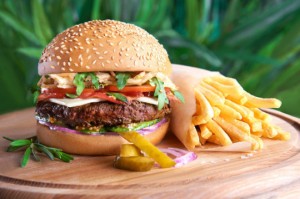
We know that eating excessive amounts of fat..well, makes us “fat”. But…have you ever wondered why that happens? Understanding what fat is, and what your body does with it, will help you manage a successfull weight loss program.
You know what calories are – they are that line in the nutritional information box on every food item you buy that tells you how much food energy a specific item of food has. And, fats, carbohydrates, and proteins all have a caloric count.
Up until this last century, the human race had always dealt with periods of “feast or famine”, and the human body evolved over time to store what we ate to help get us through the “lean times” – and ounce for ounce, fat packs more calories – or “food energy” than proteins or carbs. We’ve evolved over the centuries to “like” fat – because it is a very efficient food source. Fat contains 9 calories per gram of weight, versus 4 calories per gram of either protein or carbohydrate.
So…why don’t we just eat small amounts of fat, and skip the proteins & carbohydrates? Simple. Protein is needed by your body for growth and repair, Carbohydrates are the fuel your body needs for activity, and fat is the “backup”. Another way of looking at your body is to compare it to a nuclear reactor – and for your body to process both proteins and carbohydrates in an efficient manner, fat acts as the “control rods” to manage that reaction. Plus, you’re body needs some fat to act as a cushion for your vital organs.
We know the body requires fat to operate, but only 25% of your total calories should come from fat. And less than 10% of your calorie intake should be saturated fat -the most damaging form. The problem is – your body finds it quite easy to take dietary fat you’ve eaten, and move it to your fat stores. For your body to convert protein or carbohydrates to fat – it takes energy – and actually, burns 25 percent of their calories in that conversion process.
Another way of looking at this is – your body requires a certain amount of calories per day to function – on average, somewhere between 1500-2000 calories. By eating a higher percentage of protein and carbs than fat – you’ll burn calories with your diet. Fat, on the other hand, burns no calories as your body process it – so the higher percentage of fat in your daily calorie intake, the less calories burned during the day – and the fatter you become.
When you begin to decrease the amount of fat in your diet and replace it with carbohydrates and protein, even if you still consume the same amount of food as before, you will be consuming a lot fewer calories.
The best way to manage your fat intake is simple. Just learn how much fat is in the food you eat, and try to keep the total fat you eat during the day to around 25 % of your total calories – somewhere around 400-500 calories of fat per day. You can still enjoy the foods you like, but by being moderate in your fat intake, you’ll find your attempts at loosing fat starting to pay off.

